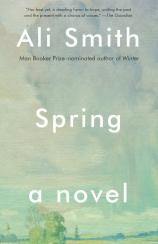Spring
Review
Spring
With SPRING, the third in the quartet of seasonal novels she began in 2017, Scottish novelist Ali Smith has produced another pulsating, often enigmatic, work that feels of a piece, but in many ways is richer than its predecessors. Employing her characteristic playful, allusive prose, she manages to again tilt our everyday world at an angle that allows us to see it with fresh eyes.
Richard Lease, a fading British film and TV director, provides one of the two points of view through whom Smith narrates this story of separation and longing. Lease recently has lost his friend, one-time lover and screenwriting partner Patricia (Paddy) Heal, to cancer and remains mired in grief. To make matters worse, he’s struggling to adapt for the screen a preposterous story of an encounter between short story writer Katherine Mansfield and poet Rainer Maria Rilke at a hotel in the Swiss Alps in 1922, shortly before Mansfield’s death. Attempting to jettison the project, Lease flees to the Scottish Highlands to contemplate the demise of his career, if not worse.
The novel’s other perspective is supplied by Brittany (Brit) Hall, a young woman who works, in a world peppered with acronyms, as a DCO at an IRC for SA4A, the shadowing conglomerate that employed one of the characters, a writer, in WINTER. It’s an immigrant detention center where casual cruelties are meted out on a daily basis to detainees the law says can only be held for 72 hours but, in some cases, have been there for years. Brit, though in this place where she “monitors indefinitely interned human beings for a salary,” does not seem of it. At the center, she meets 12-year-old Florence Smith, a remarkable adolescent who appears, seemingly out of thin air, with the goal of remedying the deplorable conditions there.
"Employing her characteristic playful, allusive prose, [Smith] manages to again tilt our everyday world at an angle that allows us to see it with fresh eyes."
Florence is preternaturally effective when she addresses herself to even the most daunting task, most strikingly her successful demand that officials rectify the abysmal state of the center's bathrooms. Her interrogation of the flustered manager she confronts about the conditions at the IRC is an example of Smith’s wicked sense of humor, and might serve as a tutorial for a clever journalist seeking to pin down an evasive interview subject.
But SPRING surges to life when Florence induces Brit to board a train with her, heading for the same small Scottish town where Richard Lease mulls his fate at the edge of a train platform and where Florence becomes a deus ex machina to jar this “old guy who’s lost the plot” out of his darkness. When that threesome takes off with a woman named Alda in her coffee truck that doesn’t really serve coffee, the novel morphs, for a time, into an unlikely road story.
SPRING seems less concerned with Brexit than its predecessors (though it does touch on the historic tensions between Scotland and England, alluding to the Battle of Culloden in 1746 and briefly recounting the tragedy of the Highland clearances of the 19th century), but Europe’s refugee crisis is in the forefront.
Smith’s depiction of the mistreatment of the “deets” under the supervision of Brit and her cohort is a reminder that the dilemma of how to deal humanely with the millions of stateless people roaming the globe in search of safe haven is a persistent theme of our times. Passing references to the #MeToo movement, “nuclear autumn” and “newsfeed shock” also ground the novel in more of the concerns of our anxiety-inducing present without submerging its essential humanity.
One of Smith’s preoccupations has been the making of art, and that surfaces again here. Her focus this time is on the visual artist and experimental filmmaker Tacita Dean and her massive chalk on blackboard work, “The Montafon Letter,” as well as her three-minute film, “A Bag of Air.” The spirits of Katherine Mansfield and Rainer Maria Rilke, of course, hover over the story, while Beethoven and Charlie Chaplin make cameo appearances. No Smith novel would be complete without its literary references, and here she playfully nods toward Yeats, Joyce, Shakespeare, T. S. Eliot and Dickens.
As is customary in Smith’s work, there are also deeply unsettling passages, like the one that opens the novel with a collage of loosely connected rants or the “140 seconds of cutting edge realism” that depicts British thugs cruelly harassing an immigrant woman. “Fear is one of my belongings,” a female character tells Lease, when he embarks on a project of interviewing a group of migrants involved in a sort of Underground Railroad rescue operation for their fellow refugees.
Though most of the novel’s action takes place in the month of October 2018, the eponymous season never seems distant. Smith concludes with a tribute to April, the month that “teaches us everything,” when one can “[p]ass any flowering bush or tree and you can’t not hear it, the buzz of the engine, the new life already at work in it, time’s factory.” Vibrating with energy, passion and wit, SPRING possesses that same buzz, a quality that propels this singular quartet into its final season.
Reviewed by Harvey Freedenberg on May 3, 2019
Spring
- Publication Date: April 7, 2020
- Genres: Fiction
- Paperback: 352 pages
- Publisher: Anchor
- ISBN-10: 1101969962
- ISBN-13: 9781101969960




